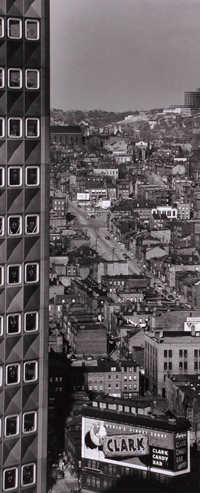Dramaturgical Notes: August Wilson’s TWO TRAINS RUNNING

Let’s begin with a few earned titles and monikers: Playwright. Historian. Preserver of culture. And as New York Times theatre critic Charles Isherwood once called him, “Theatre’s Poet of Black America.” Known as the playwright that put 100 years of African American history on the stage, no other playwright has been able to achieve what August Wilson has accomplished with his ten-play cycle, also known as the Pittsburgh Cycle or the American Century Cycle. Wilson himself has described his ten-play cycle as his effort to craft a 400-year autobiography of the African American experience. The plays in the cycle include Jitney (1982); Ma Rainey’s Black Bottom (1984); Fences (1987); Joe Turner’s Come and Gone (1988); The Piano Lesson (1990); Two Trains Running (1991); Seven Guitars (1995); King Hedley II (1999); Gem of the Ocean (2003); and Radio Golf (2005). Wilson’s oeuvre has earned him several awards, including the Tony Award for Best Play (Fences, 1987), the Olivier Award for Best New Play (Jitney, 2002), and two Pulitzer Prizes for Drama (Fences, 1987 and The Piano Lesson, 1990), among others.
Undeniably, August Wilson was fascinated with the history of Black Americans. The lack of being formally educated about Black history piqued his curiosity. Wilson once stated that he was “encouraged by the fact that in all [his] reading of history, seldom, if ever, was the Black experience in America given any weight, seldom were they admitted to the larger playing field of cause and effect.” As such, August Wilson “sought then to simply restore that experience to a primary role, thereby giving the facts of history a different perspective, and creating, in essence, a world in which the Black American was the spiritual center.” Wilson said, “Since I was not a historian but a writer of fiction, I saw as my task the invention of characters.” Accordingly, through his characters, Wilson laid claim to a past that is too often forgotten, thus filling the gaps in historical records by using his artistic license to mesh facts with a fictional imagination.
Wilson’s engagement with history is prominent in Two Trains Running—the 1960s play. However, Wilson does not directly address the historical events of the 1960s. Instead, these events hover over the play as a backdrop, thus informing the actions and motivations of the characters. The history that hovers over the play includes the legacies of leaders of the Civil Rights and Black Power Movements, namely Dr. Martin Luther King Jr. and Malcolm X. It also includes the death of Robert Kennedy, the beginning of gentrification and displacement within Black communities, and the fallout from the Vietnam War. When asked why he kept these historic events of the 1960s off the stage, Wilson responded with the following:
The play does not speak to the so-called red-lettered events of the sixties, because at the time all of that was going on—the assassination of Martin Luther King and Bobby Kennedy and all the anti-war administrations, go to work every day, you still had to pay your rent, you still had to put food on the table. And those events, while they may have in some way affected the character of society as a whole, didn’t reach the average person who was concerned with just simply living. And so in Two Trains I was more concerned with those people and what they were doing and how they were dealing with it, than I was writing a “sixties” play.
As such, Wilson peoples his plays with everyday folks—those whose lives fluctuated between what was happening nationally and what was happening regionally. Although Wilson put fictional stories on the stage, it is evident, as in Two Trains Running, that these stories are inspired by—and perhaps haunted—by real history.
August Wilson’s Two Trains Running is on stage at Court Theatre May 12 – June 13, 2022 → Get Tickets.